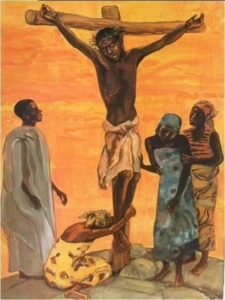 “Now is not the time to be political.” That was a response I saw to someone’s post about the mismanagement of medical supplies. I’m not sure if the “now” referred to the coronavirus pandemic or to Holy Week (or maybe both). Certainly, this is a Holy Week unlike any I have ever known. We will not be gathering in person for worship services or egg hunts. We will not be worrying about Tenebrae candles or Easter flowers.
“Now is not the time to be political.” That was a response I saw to someone’s post about the mismanagement of medical supplies. I’m not sure if the “now” referred to the coronavirus pandemic or to Holy Week (or maybe both). Certainly, this is a Holy Week unlike any I have ever known. We will not be gathering in person for worship services or egg hunts. We will not be worrying about Tenebrae candles or Easter flowers.
In the last week of Jesus’ life, the first Holy Week, Jesus marches deliberately into the center of local imperial power. He parades through the streets. He preaches in the temple. He says what he has been saying his entire ministry – only now the words seem more potent, more dangerous. He speaks of the Kingdom of God and contrasts it with the Kingdom of Rome. There is no doubt where his loyalties lie. And Rome will not ignore his treason.
In Jesus’ day, religious leaders collaborated with Roman imperial control. And Jesus, with the words of the prophets ringing in his ears, comes into the temple and brings its activity to a halt. Jesus, a Jew, is not upset about prayer and sacrifice; this is not about Jewish worship. No, he is angry that the religious leaders have turned the house of God into a hideout for their injustice.
“Economic transformation is happening before our eyes.”
He shouts, “Is it not written, ‘My house shall be called a house of prayer for all the nations’? But you have made it a den of robbers.” Jesus is angry at the empire’s oppression and injustice. He is angry at the religious leaders who unite themselves with the oppressors and perpetuate injustice rather than protecting the abused and the powerless.
Surely we can understand Jesus’ anger. A quick look at a timeline shows the connection between cascades of misinformation from our highest government leaders and the sycophantic responses of some religious leaders. It is clear that President Trump and other government leaders knew more than they told us – and weeks before they told us (an unforgivably long period of time with disastrous consequences). It is clear they downplayed, misinformed, deflected and misdirected, while offering false hope and unrealistic promises.
Many of our government officials and elected leaders have said in plain language that their wealth – and the wealth of their friends and financial supporters – is more important than the lives of the American citizens they serve. And now the president and other government leaders refuse to take responsibility for the unfathomable delays in responding to warnings about the looming crisis, in alerting and supporting state and local leaders across the country, in providing factual information to the American public and in preparing for a rapid and equitable distribution of life-saving resources.

JESUS MAFA. The Crucifixion; Jesus dies on the cross, from Art in the Christian Tradition, a project of the Vanderbilt Divinity Library, Nashville, TN.
For their part, rather than opposing such behavior, many religious leaders have condoned and even perpetuated it – defying directives to suspend group activities and to practice social distancing; spreading their own misinformation, claiming protection and cures; and, of course, blaming. This Holy Week many of our religious and government leaders are still refusing to do what is best for the health of the people of our country – continuing to gather for church services, scapegoating minorities and immigrants, trying to suspend civil rights and environmental protections and failing to provide access to medical equipment so desperately needed. This list could go on and on.
Meanwhile, Christians are called to be faithful in the journey with Jesus during this, his final week. From a public protest march on Sunday to a public demonstration in the house of worship on Monday, Jesus’ week continues until it ends in the only way it could in a land occupied by a violent empire.
The notice on the cross where Jesus was executed by the empire was written in Aramaic, Latin and Greek: “Jesus of Nazareth, King of the Jews.” Charges of political sedition dogged the first Christians. In his book, The Christians as the Romans Saw Them (1984), historian Robert Louis Wilken speaks to the broad and deep antipathy that developed in the first five centuries toward the Christian movement. Christians were thought to be fanatical, seditious, obstinate and defiant.
“Your Kingdom come on earth,” Jesus prayed and taught and lived. And they killed him for it: for his treason; for his loyalty to the realm of God. Jesus deliberately uses kingdom language. If he had wanted to avoid the political connotations of kingdom language, he could have. He could have spoken about the family of God, or the people of God or the community of God.
But he doesn’t. Instead he tells story after story of the Kingdom of God. Jesus says the kingdom of God is like a mustard seed, like a merchant in search of pearls, like yeast, like lost sheep, like a lost son. He says, “Let the little children come to me for to such as these belongs the Kingdom of God.” Jesus is presenting an alternative to the oppressive empires of this world.
In each Gospel account, Jesus is warned repeatedly that he is in danger from the empire. Jesus had every reason to be afraid. Perhaps he was. But he keeps going through his fear; he keeps going knowing his vulnerability.
Jesus shows us until his last breath a realm of peace, created not through violence, but through love; a realm of justice created through sharing, compassion and social and economic transformation; a realm of welcome created through radical inclusion.
“This is a matter of justice.”
Economic transformation is happening before our eyes. Workers considered unworthy of a living wage are the very people providing essential goods and services, in many cases putting their own health and lives in peril. These days will transform us. Let’s do what we can to ensure that transformation is toward justice, toward peace, toward compassion.
This pandemic requires us to live into the realm of God’s love and justice in new and creative ways. Our actions in these days matter. We are changing our behaviors, changing our plans, changing our lives.
 This is a matter of justice. Those of us who can stay at home must. We must demand that our government provide adequate protective equipment and other resources for medical personnel. We must demand that our government distribute life-saving resources based on need, not on favoritism. We must demand a just response to the crisis of the now unemployed and underemployed. These days are changing us. We must decide what kind of realm we want to create.
This is a matter of justice. Those of us who can stay at home must. We must demand that our government provide adequate protective equipment and other resources for medical personnel. We must demand that our government distribute life-saving resources based on need, not on favoritism. We must demand a just response to the crisis of the now unemployed and underemployed. These days are changing us. We must decide what kind of realm we want to create.
Especially for those of us who seek to follow Rabbi Jesus, now is exactly the time to be political.
Read more BNG news and opinion on this topic:
#intimeslikethese
